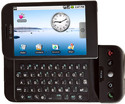Linux smartphone shipments up 49 percent
Nov 10, 2008 — by Eric Brown — from the LinuxDevices Archive — views Symbian was the only major operating system (OS) to lose share over the last year in a smartphone market that grew 28 percent, says a Canalys study. Other findings include big gains for Apple and RIM, and a 49 percent increase in sales of Linux smartphones.
Symbian was the only major operating system (OS) to lose share over the last year in a smartphone market that grew 28 percent, says a Canalys study. Other findings include big gains for Apple and RIM, and a 49 percent increase in sales of Linux smartphones.
Total smartphone shipments hit a new high of 39.9 million units in the third quarter, reports Canalys, leading to smartphones taking a roughly 13 percent share of the total mobile phone market, up from 11 percent in 2Q 2008. Although Japanese sales were off by 18 percent compared to 3Q 2007, the U.S. market almost doubled, and EMEA sales grew at 21 percent, with the biggest jumps occurring in Central and Eastern Europe, says the research firm.
The study reflects a now fairly well established theme for 2008, as reflected in other recent studies: Nokia and its Symbian OS are slipping while Apple and RIM (Research in Motion) make big gains with the iPhone and BlackBerry respectively. Apple's growth rate rose over 500 percent compared to the previous year, while RIM's grew by over 80 percent. Taiwan-based HTC, meanwhile, whose numbers did not reflect the recent release of the Linux/Android G1 phone, grew by 171.4 percent, due primarily to touch-based smartphones running Windows Mobile.
In the face of these mobile upstarts, Nokia saw its growth rate drop 3.4 percent. Yet, the Finnish phone giant still owns nearly 40 percent of the smartphone market, while Apple represents 17.3 percent, RIM has 15.2 percent, and HTC owns 5.8 percent.
| Vendor | Q3 2008 shipments | % share | Q3 2007 shipments | % share | Growth Q3'08/Q3'07 |
|---|---|---|---|---|---|
| Total | 39,850,100 | 100.0 | 31,156,240 | 100,0 | 27.9% |
| Nokia | 15,485,690 | 38.9% | 16,025,690 | 51.4 | -3.4% |
| AppIe | 6,899,010 | 17.3% | 1,107,460 | 3.6 | 523.0% |
| RIM | 6,051,730 | 15.2% | 3,298,090 | 10.6 | 83.5% |
| Motorola | 2,313,930 | 5.8% | 2,058,500 | 6.6 | 12.4% |
| HTC | 2,308,10 | 5.8% | 850,400 | 2.7 | 171.4% |
| Others | 6,791,530 | 17.0% | 7,816,100 | 25.1 | -13.1% |
WoIdwide smartphone market shares, Q3 2OO8 and Q3 2OO7
(Source: Canalys)
Linux takes some big baby steps
Despite the widely reported sales shortfalls of Motorola, which recently announced plans to ditch its aging in-house MotoMAGX Linux implementation in favor of Android, the company made some modest gains with its smartphones. Its 12.4 percent year-on-year increase has it “holding onto fourth place in smart phones thanks largely to its Linux-based models,” according to Canalys. The A1600 smartphone (pictured at top) shipped at the start of the third quarter in the U.S., having shipped earlier in Asia, and likely contributed to Mot's relatively strong numbers.
Motorola's modest improvements are reflected in major gains for the mobile OS it still dominates: Linux. Growing from a 4.4 percent share to a 5.1 percent share compared to 3Q 2007, Linux has now bridged the two million mark in quarterly shipments, representing 49 percent growth year-on-year, says Canalys. The estimate goes counter to Gartner's report on 2Q smartphone sales, where it reported Linux losing share. Other vendors, including ABI Research, have also noted gains by mobile Linux.
The Linux growth rate of 49 percent beats out Microsoft's 42.9 percent gain, although the latter still controls a far greater 13.6 percent share of the smartphone market. Despite seeing its share drop by over 12 percent, Symbian, which is now owned entirely by Nokia, and is set for its own brave journey into open source over the next year or two, still represents a leading 46.6 percent of the market (see OS table below).
| OS Vendor | Q3 2008 shipments | % share | Q3 2007 shipments | % share | Growth Q3'08/Q3'07 |
|---|---|---|---|---|---|
| Total | 39,850,100 | 100.0% | 31,156,240 | 100.0% | 27.9% |
| Symbian | 18,583,060 | 46.6% | 21,219,390 | 68.1% | -12.4% |
| AppIe | 6,899,010 | 17.3% | 1,107,460 | 3.6% | 523.0% |
| RIM | 6,051,730 | 15.2% | 3,298,090 | 10.6% | 83.5% |
| Microsoft | 5,425,470 | 13.6% | 3,797,360 | 12.2% | 42.9% |
| Linux | 2,028,490 | 5.1% | 1,361,810 | 4.4% | 49.0% |
| Others | 862,340 | 2.2% | 372,130 | 1.2% | 131.7% |
Worldwide smartphone market shares, Q3 2008, Q3 2007
(Source: Canalys)
Stated Canalys analyst Tim Shepherd, regarding Nokia's troubles, “Nokia has taken time to bring a touch screen product to market in the wake of the iPhone's success, despite having had the experience of producing the Series 90-based 7710 four years ago. Conversely, vendors such as HTC with its Touch Diamond have capitalized on customer demand for this type of product.”
Noting the importance of responding quickly to trends in the smartphone market, Shepherd added, “Nokia's acquisition of Symbian should help it in this regard.”
 HTC's Google Android-based G1 (Click for details) |
The impact of the HTC G1 (pictured), as well as other potential Android-based arrivals, will start showing up in the 4Q report, says Canalys. Based on strong pre-sale numbers and a massive new advertising campaign for the G1 by carrier T-Mobile, one would expect Linux to see a fairly major boost. However, Shepherd questions whether the G1's keyboard approach is going to click. “While they will appeal to some, particularly professional users, research suggests that devices with large, slide-out keyboards just don't resonate as well in the consumer market as pure touch screen designs,” he stated.
Canalys notes that “more vendors and a wider range of [Android] device designs will be needed to achieve significant global shipment levels.” One interesting question not addressed by the Canalys overview of the report is whether phones based on the LiMo Foundation spec will have a major impact on Linux numbers, now that one of its leading proponents, Motorola, is shifting exclusively to Android. However, Motorola could certainly change its mind about LiMo, if and when LiMo-compliant stacks reach the market.
Availability
The 3Q 2008 edition of the seven-year-old Canalys smart phone and mobile navigation trends report is available now, says the company. More information may be found here.
This article was originally published on LinuxDevices.com and has been donated to the open source community by QuinStreet Inc. Please visit LinuxToday.com for up-to-date news and articles about Linux and open source.